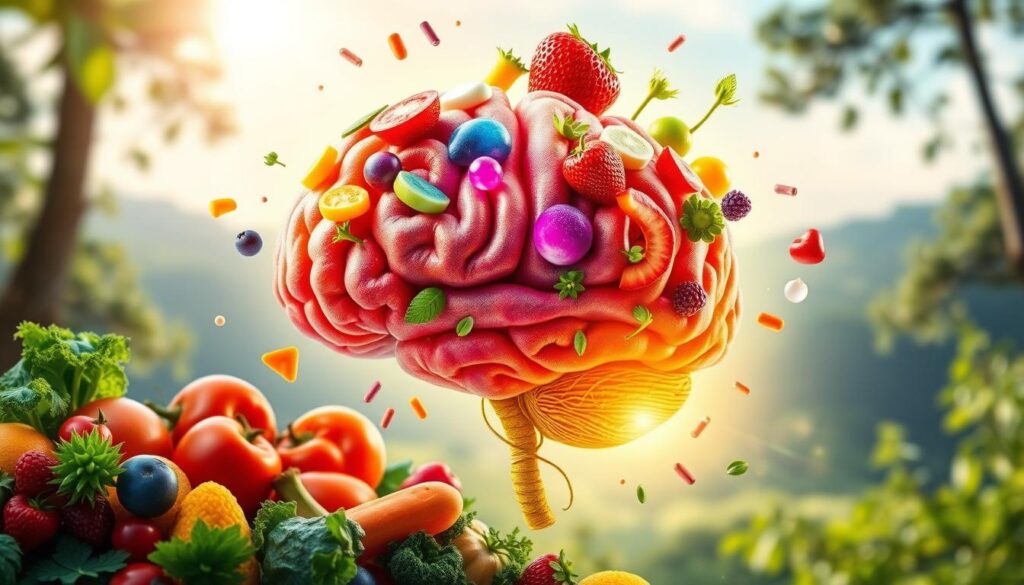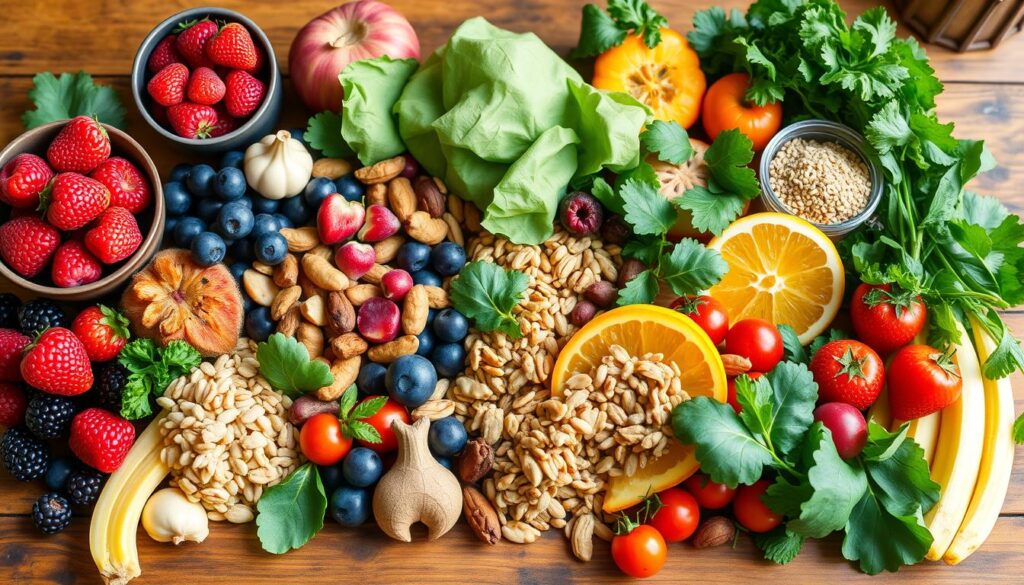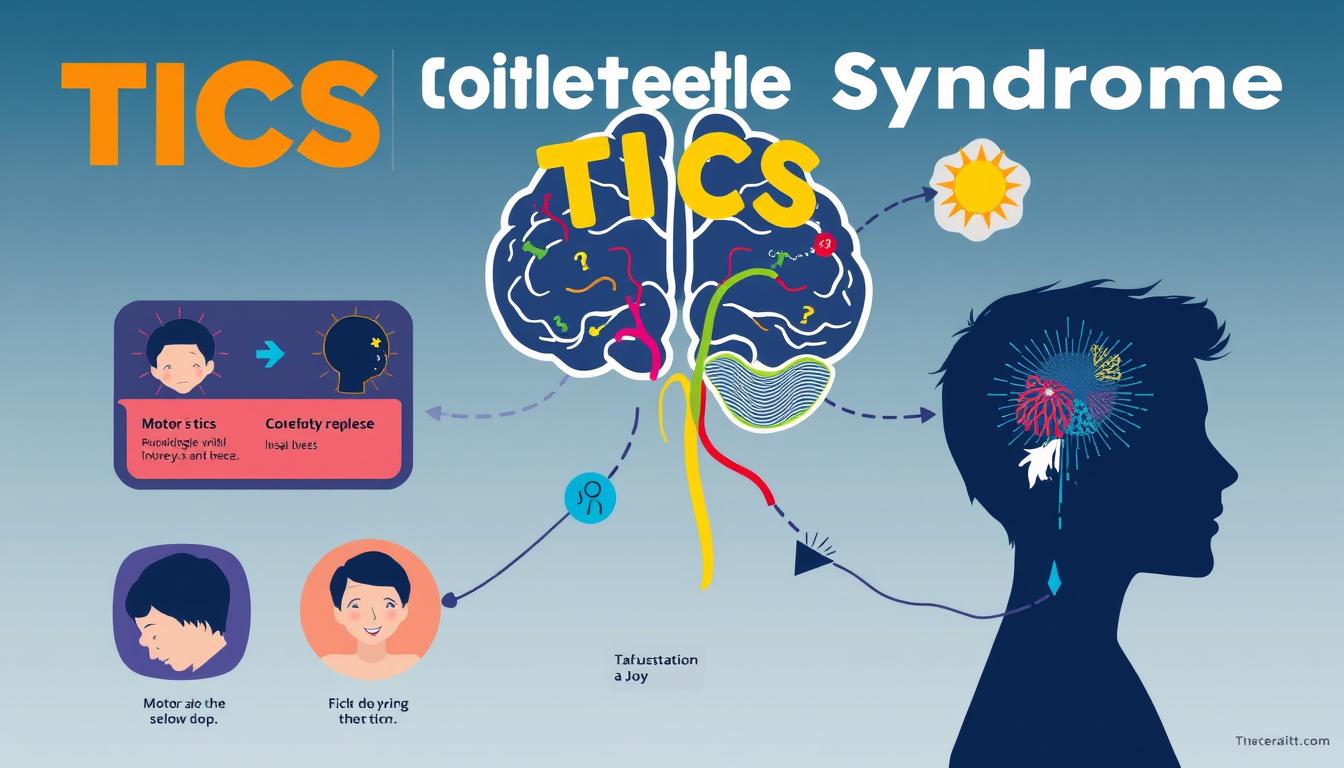As a parent or caregiver, you are key in your child’s well-being, including their mental health. New studies show how food affects a child’s thinking, feelings, and ability to handle stress. This guide explores how food and mental health are connected, helping you make better food choices for your child’s brain growth.
Key Takeaways
- Nutrition is vital for kids’ mental health and brain growth.
- Important nutrients like omega-3s, vitamins, and minerals help with thinking and mood.
- The connection between the gut and brain shows how food choices affect kids’ mental health.
- It’s important to spot and fix nutritional gaps to support mental health.
- Eating a balanced diet helps build a child’s mental and emotional strength.
Understanding the Role of Nutrition in Supporting Children’s Mental Health
Nutrition is key to children’s mental health and happiness. The link between what we eat and brain development is fascinating. This field is called nutritional psychiatry. It helps parents and caregivers make choices that support their kids’ brain health and good dietary patterns.
The Science Behind Brain-Food Connection
The human brain needs a mix of nutrients to work well. Foods affect brain cells and thinking skills. Studies in nutritional psychiatry show how diet impacts mood, behavior, and thinking.
Key Nutrients for Mental Wellness
- Omega-3 fatty acids: These fats are important for brain cells and thinking.
- B vitamins: They help with energy, mood, and making neurotransmitters, which are key for mental health.
- Antioxidants: Vitamins C and E protect the brain from damage and help it stay strong.
- Minerals: Zinc, iron, and magnesium are important for brain growth, neurotransmitters, and mental health.
How Diet Affects Mood and Behavior
What we eat affects our mood and actions. Eating too much processed food, sugar, and refined carbs can lead to depression and anxiety in kids. On the other hand, eating whole, nutrient-rich foods can improve mood and thinking skills.
“Nourishing the brain with the right nutrients is crucial for supporting mental health and well-being in children.”
Knowing how food affects the brain helps families support brain health and mental well-being in kids.
The Gut-Brain Connection: How Food Choices Impact Mental Well-being
The link between your child’s gut and brain is quite strong. What they eat affects their mood and thinking skills. Learning about the gut-brain connection helps you choose foods that support their mental health.
The gut microbiome, a mix of bacteria in the stomach, is key. A healthy gut is linked to better mood and thinking. But, micronutrient deficiencies can upset this balance, causing mood swings and mental issues.
A diet missing omega-3s, vitamin D, and B vitamins can lead to depression and anxiety in kids. Giving your child foods rich in these nutrients helps their mental and brain health.
The gut microbiome also affects the immune system and inflammation. An imbalance can cause inflammation linked to mental health problems. Keeping the gut healthy helps manage inflammation and supports mental well-being.
Understanding the gut-brain connection is crucial for your child’s mental health. Eating nutrient-rich foods and fixing micronutrient deficiencies helps with mood, thinking, and overall mental health.
Essential Nutrients That Power Your Child’s Brain Development
Good nutrition is key for your child’s brain growth and health. Three nutrients are especially important: omega-3 fatty acids, vitamins and minerals, and protein.
Omega-3 Fatty Acids and Brain Function
Omega-3 fatty acids, found in fish oil, are vital for brain health. They help with brain structure and function. Foods like fatty fish, walnuts, and flaxseeds support cognitive development and brain health.
Vitamins and Minerals for Mental Health
Other nutrients are also crucial for mental health and nutritional psychiatry. B vitamins, iron, zinc, and magnesium help with neurotransmitters, energy, and mood. Making sure your child gets these nutrients is important for their well-being.
Protein’s Role in Neurotransmitter Production
Protein is key for making neurotransmitters, which help brain cells talk to each other. Giving your child protein from lean meats, eggs, beans, or nuts supports mood, focus, and brain function.
Eating a diet full of these nutrients boosts your child’s cognitive development and brain health. It’s vital for their growth and development.

Dietary Patterns That Support Mental Wellness in Children
The link between diet and mental health in kids is clear. Some eating habits boost brain health and thinking skills. Let’s look at these good eating habits for your child’s mental health.
The Mediterranean Diet for Brain Health
The Mediterranean diet focuses on fresh fruits, veggies, whole grains, and healthy fats. It’s good for kids’ mental health. It gives the brain what it needs to grow and work well, like omega-3 fatty acids, antioxidants, and complex carbs.
- Add colorful fruits and veggies to your child’s meals.
- Go for whole grains like brown rice, quinoa, and whole wheat bread.
- Use healthy fats from avocados, nuts, and olive oil.
Balanced Diets for Cognitive Function
A balanced diet with many nutritious foods helps kids’ mental health. It makes sure the brain gets all the vitamins, minerals, and macronutrients it needs.
- Make sure meals have lean proteins, complex carbs, and healthy fats.
- Encourage eating a variety of fruits and veggies for antioxidants and fiber.
- Keep your child hydrated with plenty of water all day.
By following these dietary patterns, you support your child’s mental wellness. A healthy diet is key for a healthy mind.

Recognizing and Addressing Nutritional Deficiencies
Keeping kids’ minds healthy is all about good nutrition. A balanced diet is key, but spotting micronutrient deficiencies is also vital. It helps keep their brain health and overall health in top shape.
Common Deficiencies Affecting Mental Health
Some nutrients are super important for kids’ mental health. Lack of iron, zinc, vitamin B12, folate, and omega-3 fatty acids can lead to mental health issues. This includes depression, anxiety, and ADHD.
Signs Your Child Needs Dietary Changes
- Persistent fatigue or lack of energy
- Mood swings or irritability
- Difficulty concentrating or poor academic performance
- Frequent infections or illness
- Delayed growth or development
Working with Healthcare Providers
If you think your child might have nutritional deficiencies affecting their mental health, talk to their doctor. They can check for any deficiencies and suggest the right diet changes or nutritional psychiatry help.
| Nutrient | Potential Mental Health Benefits |
|---|---|
| Iron | Supports cognitive function, attention, and mood regulation |
| Zinc | Aids in the production of neurotransmitters and brain development |
| Vitamin B12 | Plays a role in energy metabolism and nervous system function |
| Folate | Contributes to the production of serotonin and dopamine |
| Omega-3 Fatty Acids | Promote brain cell communication and reduce inflammation |
By tackling nutritional deficiencies and tweaking their diet, parents can boost their kids’ brain health and mental well-being.
Conclusion
In this guide, we’ve looked at how nutrition helps your child’s mental health and well-being. You now know how to feed your child’s mind and support their mental health. This knowledge helps you make better choices for your child’s diet.
We’ve covered the important nutrients for brain growth and how food affects mood and behavior. This guide gives you the tools to create a diet that’s good for your child’s brain. It’s also important to watch for nutritional gaps and work with health experts to meet your child’s needs.
Making nutrition a priority is essential for your child’s mental health and well-being. By using the tips from this guide, you can help your child grow strong and healthy. This sets them up for success in life, both mentally and physically.



